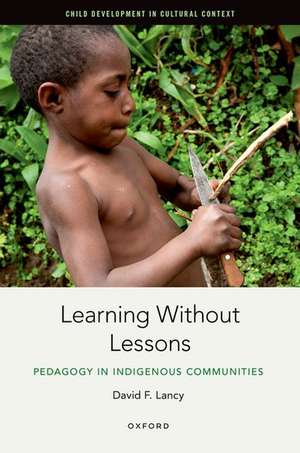Learning Without Lessons: Pedagogy in Indigenous Communities: Child Development in Cultural Context
Autor David F. Lancyen Limba Engleză Hardback – 2 mar 2024
Preț: 372.97 lei
Preț vechi: 511.92 lei
-27% Nou
Puncte Express: 559
Preț estimativ în valută:
71.39€ • 74.24$ • 59.82£
71.39€ • 74.24$ • 59.82£
Carte disponibilă
Livrare economică 10-15 februarie
Preluare comenzi: 021 569.72.76
Specificații
ISBN-13: 9780197645598
ISBN-10: 0197645593
Pagini: 296
Ilustrații: 33 text boxes; 1 b/w photograph
Dimensiuni: 224 x 79 x 36 mm
Greutate: 0.61 kg
Editura: Oxford University Press
Colecția OUP USA
Seria Child Development in Cultural Context
Locul publicării:New York, United States
ISBN-10: 0197645593
Pagini: 296
Ilustrații: 33 text boxes; 1 b/w photograph
Dimensiuni: 224 x 79 x 36 mm
Greutate: 0.61 kg
Editura: Oxford University Press
Colecția OUP USA
Seria Child Development in Cultural Context
Locul publicării:New York, United States
Recenzii
A century on from Mead, childhood is an area where the world desperately needs anthropology, and Lancy's book is a valuable resource for showing why.
This book is a brilliant overview of Indigenous children's learning. I recommend it to teachers and parents. It challenges thinking about children's capabilities and preferences. It challenges claims about what aspects of human development are innate and universal.
Learning Without Lessons is about the acquisition of knowledge through these natural activities children are engaged in during their family and community routines of life. Bringing these ways of learning to life in rich detail is the first goal of this terrific book by David Lancy.
Recommended. Graduate students and faculty only.
I found this book a brilliant overview of Indigenous children's learning. I recommend it to teachers and parents. It will stimulate a re-assessment of whether WEIRD communities are adequately child-friendly. It challenges thinking about children's capabilities and preferences. It challenges claims about what aspects of developmental psychology are innate and universal.
Lancy draws on the research on learning from a wide range of authors from general anthropology and educational anthropology, psychological anthropology, developmental psychology, comparative education, and cultural psychology. He uses ethnographic texts from the books, articles, and monographs assembled in the Human Relations Area Files (HRAF) on learning, parenting, and child development. He includes a very wide range of examples and conceptual frameworks. Indeed, Lancy's reference list is a comprehensive go-to for those interested in this field.
I recommend supplementing Lancy's ethnological insights with analyses of why WEIRD societies approach childhood as they do (I introduce concepts such as adultism, White Saviour Complex, and binary dualisms, contextualised with history of Western science and imperialism). A century on from Mead, childhood is an area where the world desperately needs anthropology, and Lancy's book is a valuable resource forshowing why.
This book is a brilliant overview of Indigenous children's learning. I recommend it to teachers and parents. It challenges thinking about children's capabilities and preferences. It challenges claims about what aspects of human development are innate and universal.
Learning Without Lessons is about the acquisition of knowledge through these natural activities children are engaged in during their family and community routines of life. Bringing these ways of learning to life in rich detail is the first goal of this terrific book by David Lancy.
Recommended. Graduate students and faculty only.
I found this book a brilliant overview of Indigenous children's learning. I recommend it to teachers and parents. It will stimulate a re-assessment of whether WEIRD communities are adequately child-friendly. It challenges thinking about children's capabilities and preferences. It challenges claims about what aspects of developmental psychology are innate and universal.
Lancy draws on the research on learning from a wide range of authors from general anthropology and educational anthropology, psychological anthropology, developmental psychology, comparative education, and cultural psychology. He uses ethnographic texts from the books, articles, and monographs assembled in the Human Relations Area Files (HRAF) on learning, parenting, and child development. He includes a very wide range of examples and conceptual frameworks. Indeed, Lancy's reference list is a comprehensive go-to for those interested in this field.
I recommend supplementing Lancy's ethnological insights with analyses of why WEIRD societies approach childhood as they do (I introduce concepts such as adultism, White Saviour Complex, and binary dualisms, contextualised with history of Western science and imperialism). A century on from Mead, childhood is an area where the world desperately needs anthropology, and Lancy's book is a valuable resource forshowing why.
Notă biografică
David F. Lancy, Ph.D., is Emeritus Professor of Anthropology at Utah State University. Beginning in 1968 in Liberia, Lancy has done extensive cross-cultural fieldwork and repeated surveys of the ethnographic record with children as the focus. In total, he has authored eleven books and edited three. His current research interests center on the study of delayed personhood, the chore curriculum, children as a reserve labor force, children growing up in a Neontocracy, how children acquire their culture, socio-historical analyses of schooling, and the culture of street kids. His distinctions include the Utah State University Career Scholar award and Carnegie award for teaching excellence.



